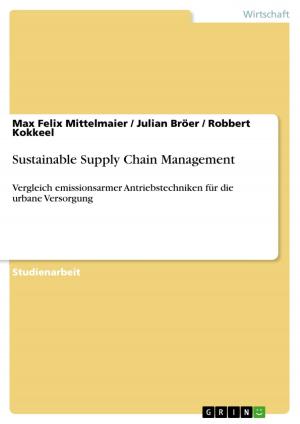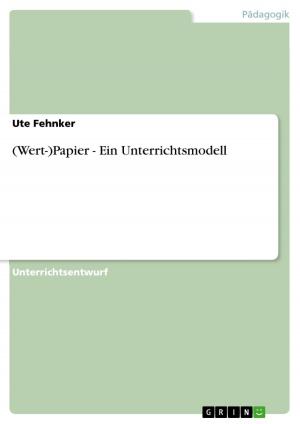| Author: | Annika Wildersch | ISBN: | 9783640483228 |
| Publisher: | GRIN Verlag | Publication: | December 1, 2009 |
| Imprint: | GRIN Verlag | Language: | English |
| Author: | Annika Wildersch |
| ISBN: | 9783640483228 |
| Publisher: | GRIN Verlag |
| Publication: | December 1, 2009 |
| Imprint: | GRIN Verlag |
| Language: | English |
Seminar paper from the year 2006 in the subject English Language and Literature Studies - Literature, grade: 1,3, University of Hamburg (Insitut für Anglistik), course: 'Alternate Worlds': Utopian and Counterfictional English Fiction from the late 19th Century to the 1990's, language: English, abstract: 1.Introduction (...) Island is a novel of ideas, light on the novel-part and heavy on the ideas. In fact it could also be seen as an essay with a bit of a plot entangled around it. The plot in any case is secondary and easy to summarize: The English journalist Will Farnaby is stranded on the island of Pala and is on the secret mission to negotiate a contract for oil. Injured in the beginning, he leads long conversations with some inhibitants through which he learns about the Palanese way of life. As he takes pleasure in their virtues and beliefs, he gives up his initial oil plans. Nevertheless, in the end Pala gets invaded by the neighbour island Rendang. The emphasis in Island lies in the long conversations that Will leads in which he learns about the Palanese lifestyle and through which we, the readers, get to know about Huxley's ideas of an ideal society. The questions this research paper deals with are: What exactly are the utopian features in Island? Are those features attainable and what is more, are they worth to attain at all? And in this context, is Island rather a utopia of escape or reconstruction? In order to find out the answers to these questions, the paper will first offer an analysis of the ideas and then it will turn to the 'novel'-part with an analysis of the main plot.
Seminar paper from the year 2006 in the subject English Language and Literature Studies - Literature, grade: 1,3, University of Hamburg (Insitut für Anglistik), course: 'Alternate Worlds': Utopian and Counterfictional English Fiction from the late 19th Century to the 1990's, language: English, abstract: 1.Introduction (...) Island is a novel of ideas, light on the novel-part and heavy on the ideas. In fact it could also be seen as an essay with a bit of a plot entangled around it. The plot in any case is secondary and easy to summarize: The English journalist Will Farnaby is stranded on the island of Pala and is on the secret mission to negotiate a contract for oil. Injured in the beginning, he leads long conversations with some inhibitants through which he learns about the Palanese way of life. As he takes pleasure in their virtues and beliefs, he gives up his initial oil plans. Nevertheless, in the end Pala gets invaded by the neighbour island Rendang. The emphasis in Island lies in the long conversations that Will leads in which he learns about the Palanese lifestyle and through which we, the readers, get to know about Huxley's ideas of an ideal society. The questions this research paper deals with are: What exactly are the utopian features in Island? Are those features attainable and what is more, are they worth to attain at all? And in this context, is Island rather a utopia of escape or reconstruction? In order to find out the answers to these questions, the paper will first offer an analysis of the ideas and then it will turn to the 'novel'-part with an analysis of the main plot.















